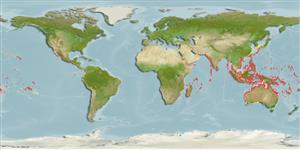Teleostei (teleosts) >
Gobiiformes (Gobies) >
Gobiidae (Gobies) > Gobiinae
Etymology: Oplopomus: Greek, hoplon = weapon + Greek,poma, -atos = cover, operculum (Ref. 45335).
More on author: Valenciennes.
Environment: milieu / climate zone / depth range / distribution range
Ecology
Marine; reef-associated; depth range 1 - 30 m (Ref. 1602), usually 1 - 20 m (Ref. 27115). Tropical; 22°C - 29°C (Ref. 27115)
Indo-Pacific: East Africa to the Society Islands, north to the Ryukyu Islands (Ref. 559).
Size / Weight / Age
Maturity: Lm ? range ? - ? cm
Max length : 10.0 cm SL male/unsexed; (Ref. 48637)
Dorsal spines (total): 7; Dorsal soft rays (total): 10; Anal spines: 1; Anal soft rays: 10. Males with more intense blue spots on the head and more colorful markings on fins than females; subadults lack the blue and yellow spotting but have more black spots (Ref. 1602); characterized further by having forth and fifth dorsal spines prolonged in male and may have filamentous tips; strong and sharp tipped first spine of each dorsal fin; united pelvic fins, well developed frenum present; rounded caudal fin, shorter than head length; longitudinal scale series 29-30; predorsal scales about 13; mainly ctenoid scales on body; cycloid scales on prepectoral area, breast and abdomen; preopercular margin just above angle with 1-3 small spines; depth of body 4.0-4.6 in SL (Ref. 90102).
Inhabits silty bottoms of inner lagoons and bays (Ref. 9710). Solitary or in pairs (Ref. 90102). Also occurred in shallow to deep coastal sand and mud flats, usually on the sand near large depression with burrow in the middle (Ref. 48637).
Life cycle and mating behavior
Maturity | Reproduction | Spawning | Eggs | Fecundity | Larvae
Randall, J.E., G.R. Allen and R.C. Steene, 1990. Fishes of the Great Barrier Reef and Coral Sea. University of Hawaii Press, Honolulu, Hawaii. 506 p. (Ref. 2334)
IUCN Red List Status (Ref. 130435: Version 2024-2)
Threat to humans
Harmless
Human uses
Fisheries: commercial; aquarium: commercial
Tools
Special reports
Download XML
Internet sources
Estimates based on models
Preferred temperature (Ref.
123201): 24.7 - 29, mean 27.8 °C (based on 1054 cells).
Phylogenetic diversity index (Ref.
82804): PD
50 = 0.7500 [Uniqueness, from 0.5 = low to 2.0 = high].
Bayesian length-weight: a=0.01023 (0.00477 - 0.02194), b=3.01 (2.83 - 3.19), in cm total length, based on LWR estimates for this (Sub)family-body shape (Ref.
93245).
Trophic level (Ref.
69278): 3.4 ±0.4 se; based on size and trophs of closest relatives
Resilience (Ref.
120179): High, minimum population doubling time less than 15 months (Preliminary K or Fecundity.).
Fishing Vulnerability (Ref.
59153): Low vulnerability (10 of 100).
Nutrients (Ref.
124155): Calcium = 113 [61, 222] mg/100g; Iron = 0.791 [0.415, 1.434] mg/100g; Protein = 18.4 [16.5, 20.1] %; Omega3 = 0.15 [0.07, 0.26] g/100g; Selenium = 21.7 [12.0, 41.9] μg/100g; VitaminA = 140 [39, 428] μg/100g; Zinc = 1.93 [1.31, 2.82] mg/100g (wet weight);
